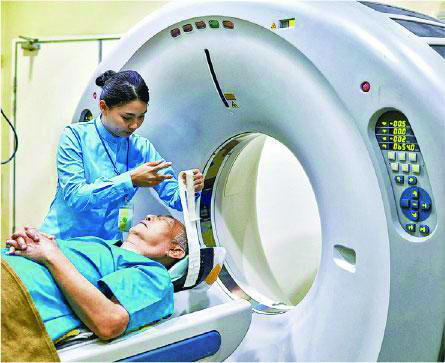[Wan Qing Nursing]Can cause accidental trauma or death Sudden syncope needs to find out the cause
[ad_1]
Text: Liang Wanfu (geriatrician), Ming Pao
Geriatrics Dr Leung Man Fook
Lao Feng fainted 3 times within half a year, but woke up each time before being sent to the emergency room. He seemed to be back to normal, and no problems could be found in the hospital for observation. For fear of fainting again at any time, Lao Feng became timid and stayed at home all day, daring not to do anything.
What the hell happened?
(Hong Kong News) An old classmate “Big Brother Cheng” called and said that his partner Lao Feng had been admitted to the hospital several times recently, but he still doesn’t know what happened. Every time Lao Feng was sent to the hospital, he was fine, but he suddenly fainted and became unconscious, and he seemed to be fine after waking up. If so, they have been in and out of the hospital many times. The cause is still unknown.
abdominal pain before passing out
After the eldest brother became successful, he found that Lao Feng looked very inappropriate. He was usually very active and strong, but he became timid and worried, staying at home all day and not daring to go out. As for the usual activities, such as mountain climbing and Tai Chi, I dare not even touch them. He said that he didn’t know when something would happen to his body, and he didn’t know what to do once he fainted and became unconscious. Seeing that the old partner suddenly lost confidence in his own abilities and was full of doubts about everything, Big Brother Cheng thought of me.
“Ah Fu, there’s something really wrong with Old Feng! Please help to find out what happened to him.” The eldest brother Cheng said.
“Okay. I’ll give it a try. However, fainting can be very difficult. You have to find out the cause before you can prescribe the right medicine.” I replied.
Lao Feng is 68 years old this year. He used to be the business partner of eldest brother Cheng. They have long since retired. Lao Feng and his wife lived a happy retirement life for two people. He has a lot of interests, and enjoys outdoor activities such as stargazing, photography, hiking, traveling, and gardening; but now he feels that he can’t do anything, dare not do anything, and life is boring.
Mrs. Feng told me about her husband’s situation one by one.
“The epidemic has lasted for three years. We were lucky and we were not recruited. Just when we were secretly happy, one day old Feng suddenly became unconscious and fainted at home. I was really scared and immediately called 999 to take him to the hospital. When he arrived at the emergency room, he Although he has woken up, he has to stay in the hospital for observation. But two days later, the doctor said that he can be discharged from the hospital and everything is normal.”
“We thought it was normal to faint once in a while. But within two months, he fainted again! But before fainting this time, he felt abdominal pain and discomfort. I was really worried. Like last time, when he arrived in the emergency room He has woken up, and it seems that there is nothing wrong. The doctor arranged for him to stay in the hospital for another two days for examination, but the cause was also not found, and there was no medicine. They only asked us to make an appointment with a specialist for follow-up after discharge.”
Feng Tai said the situation twice in one breath, but it turned out that there was a third fainting. Three months later, in mid-December, Lao Feng suddenly fainted again at home. He woke up on the way to the hospital and stayed in the hospital for observation for another two days. The difference was that he was then scheduled to make an appointment for an MRI of the brain.
Sudden fainting is linked to brain failure
“Dr. Liang, the examination is scheduled for 1 year and 3 months! Why is it so long? I am really worried. If he faints again during this period, he may fall and hit his head. Will his life be in danger? I dare not Think about it. Help him find out what happened!” Mrs. Feng said.
After listening to Mrs. Feng’s description, I tried to explain it from a pathological perspective. When a person suddenly faints and becomes unconscious, it should be related to brain failure. Failures can be short-lived or more permanent. According to observations, Lao Feng’s 3 faintings were all short-lived, and he should be suffering from a disease that causes temporary brain dysfunction. The cause may include: brain pathology or cardiovascular pathology.
Both of these pathologies can cause the patient to lose consciousness for a short period of time, then faint, but wake up when brain function is restored.
Among cardiovascular diseases, the most common causes of sudden syncope include: abnormal heart rhythm, brief cardiac arrest, and sudden hypotension. Since the symptoms of abnormal heart rhythm or short-term cardiac arrest appear suddenly, patients do not have aura before syncope, and suddenly become unconscious without warning, and even fall to the ground.
Fortunately, most cases of sudden cardiac arrest are short-lived, and the duration is usually not too long. Most of them last for 1 to 2 minutes. Many patients have slowly woken up before the emergency medical personnel arrived. Otherwise, if the heart stops for a long time, the patient will undoubtedly die.
However, sudden syncope is dangerous in any case. Because no matter at any time, place and situation, the patient may faint and lose consciousness immediately.
From this, it can be imagined that if the patient is active in high ground, driving, or on the stairs or on the road, sudden syncope can lead to serious accidental trauma and even death.
Therefore, if sudden fainting is found, it is best to find out the cause and treat it as soon as possible.

There are auras before the onset of epilepsy
If you are a patient with coronary heart disease, or a person over the age of 60 whose body is beginning to show signs of degeneration, the chances of suffering from abnormal heart rhythm or short-term cardiac arrest will be higher. If you have tried to faint suddenly, tests such as heart rhythm check, electrocardiogram, and 24-hour monitoring of heart rhythm and beating are all indispensable.
In case symptoms are detected but ECG monitoring does not show data, longer-term monitoring is required. Once diagnosed, it is necessary to complete the pacemaker implantation operation as soon as possible to prevent the sudden stop of the heartbeat.
In addition to heart rhythm problems, low blood pressure can also cause fainting. Especially when standing up from a lying or sitting position, the blood pressure in the body drops suddenly, forming orthostatic hypotension, and fainting. Orthostatic hypotension can be affected by diabetes, endocrine disease, neurological disease, or cardiovascular disease. In addition, drugs can affect orthostatic blood pressure. Therefore, it is best to find out the cause of fainting from medical examination, and then make targeted treatment.
Another brain pathology that causes fainting is cerebral epilepsy. The patient will suddenly twitch his hands and feet, tremble all over his body, turn his eyes white, and spit out saliva, and then lose consciousness, faint, and even stop breathing for a few seconds.
“Fat sheep hanging” is a common name that is more familiar to people (but this name has long been used in medicine). The main cause of epilepsy is the disorder of brain waves. Brain cells intermittently emit abnormal waves, causing special changes.
To explore the cause, it is often because of some kind of lesion or injury in the brain, and a small part is related to genetics. The age of onset of epilepsy is mainly divided into three periods: the first is infancy, the second is before and after entering primary and secondary schools, and the third is over 65 years old. Cerebral epilepsy in children and adolescents is mostly caused by head injury, heredity, or encephalitis; adult epilepsy is mainly affected by brain tumors; and the elderly mostly occur after stroke, but there are still many cases that cannot be identified clearly. cause.
However, the vast majority of patients with epilepsy will have aura before the onset, such as stomach pain, headache, repeated chewing, lip licking, loss of consciousness, etc.; the loss of consciousness can last for several minutes to 20 minutes. After waking up, most patients feel drowsy, some will fall asleep immediately, and some will vomit and even become incontinent.
Before I finished explaining, Mrs. Feng responded first: “Doctor, he must have cerebral epilepsy! First, he is 68 years old, which is the third stage of this disease; second, every time he faints, he has aura and feels Headache and discomfort; third, every time I faint for more than 10 minutes; fourth, I am very tired after waking up.”

[ad_2]
Source link

![[Love Wants Sexual Happiness Series 358]Find the culprit and overcome psychogenic erectile dysfunction. Don’t let pressure affect your sexual happiness.](https://chinathenews.com/wp-content/uploads/2024/04/171111-780x420.jpg)

![[Wanqingyi Care]My health, my rights, customized medical methods in the last stage of life](https://chinathenews.com/wp-content/uploads/2024/04/ZZ1-100-780x420.jpg)
![[Kidney Transplantation Special Topic]The survival rate of transplanted kidneys is high without dialysis treatment three times a week](https://chinathenews.com/wp-content/uploads/2024/04/1311-780x420.jpg)



